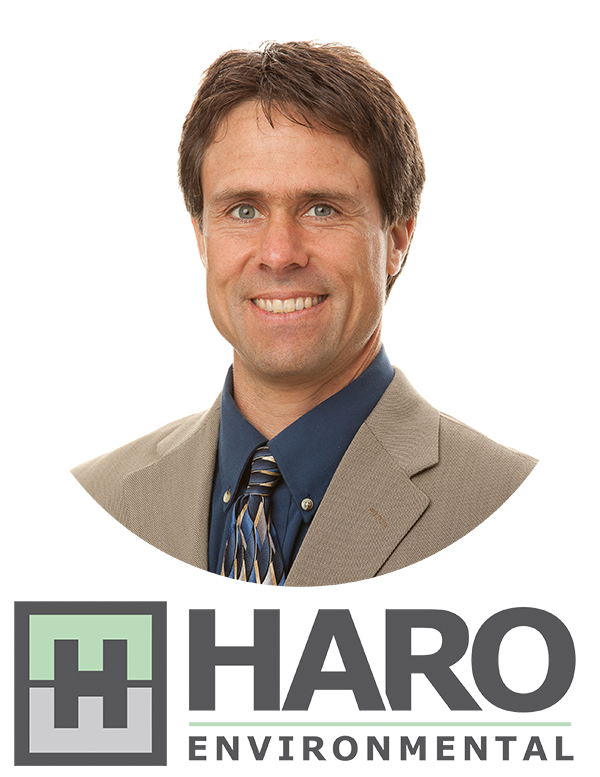 Choosing a career in environmental sciences was an easy choice for Elliot Haro, Vice President and Principal Scientist at Haro Environmental, Inc., an environmental consulting firm and valued REGENESIS client. In high school, Haro was already interested in chemistry, math and biology, three important subject areas that would eventually frame his undergraduate studies in college. “I really enjoyed math and chemistry in the first two years of college,” says Haro. “Then I took an introduction course on soils and realized this field included a great combination of math, chemistry, and biology. I knew then that for me, environmental science was the perfect match!” As an executive with Haro Environmental, Inc., Elliot is responsible for a wide range of the firm’s services, which provides him with ongoing diversity in his work. He continues, “My current role with the company includes managing everything from procurement and marketing to project management and project implementation, including sampling and reporting. As such, there’s a nice balance between field work and office work.” He also likes the fact that each day is different. His work spans client and contract management, project management where he manages field services and reporting, to soil, soil vapor and groundwater investigations and site assessment.
Choosing a career in environmental sciences was an easy choice for Elliot Haro, Vice President and Principal Scientist at Haro Environmental, Inc., an environmental consulting firm and valued REGENESIS client. In high school, Haro was already interested in chemistry, math and biology, three important subject areas that would eventually frame his undergraduate studies in college. “I really enjoyed math and chemistry in the first two years of college,” says Haro. “Then I took an introduction course on soils and realized this field included a great combination of math, chemistry, and biology. I knew then that for me, environmental science was the perfect match!” As an executive with Haro Environmental, Inc., Elliot is responsible for a wide range of the firm’s services, which provides him with ongoing diversity in his work. He continues, “My current role with the company includes managing everything from procurement and marketing to project management and project implementation, including sampling and reporting. As such, there’s a nice balance between field work and office work.” He also likes the fact that each day is different. His work spans client and contract management, project management where he manages field services and reporting, to soil, soil vapor and groundwater investigations and site assessment.
The Path to Environmental Remediation
Haro’s path to environmental remediation started while in college. After earning his BS and MS in Soil Science from California Polytechnic State University, he worked as an Associate Soil Scientist, working his way up to Senior Soil Scientist for a several environmental consulting and engineering firms. He then helped form Haro Environmental, Inc. in 2013, with the goal of providing best in-class, client-focused consulting services. He continues, “I believe this is what sets us apart from other consulting firms. Unlike other firms which often utilize staff-level employees to perform the work which could result in critical items being missed, we have senior-level staff intimately involved in all of aspects of our projects. This enables us to maintain close contact with the client to ensure their goals are met.” To stay abreast of changes in technology and advancements within the environmental remediation industry, Haro regularly attends webinars on remediation and monitoring trends. When asked what he enjoys most about his work he points to two simple words he likes to hear from clients. He shares, “The best part is when the client says ‘thank you’, because that tells me we are doing a good job and validates our commitment to client goals. Another rewarding aspect about the environmental field is the challenge and success of developing remediation alternatives that minimize the environmental impact. For example, using in-situ remediation strategies instead of dig and haul can conserve resources such as diesel fuel for the excavation equipment, and the disposed soil to a landfill. This means fewer trucks on the highway and also eliminates the need to import clean fill soil.” And the most challenging aspect of his work? “Figuring out ways to reduce environmental contaminants to concentrations, for unrestricted land use.”
Partnering with REGENESIS in a Changing Environmental Industry
When he’s not involved in groundwater monitoring, investigating soil vapor, or a host of other day-to-day work responsibilities, Haro can be found surfing somewhere off California’s Central Coast, near Los Osos, where he lives with his wife and two children. “I’m up for anything in the ocean,” he says, “Except sharks! I really enjoy surfing, and living on the central coast offers great opportunities for that.” He is also involved in charity work, and points out that Haro Environmental, Inc. donates its services to support local non-profit organizations, including the Land Conservancy of San Luis Obispo. When it comes to working with REGENESIS, Haro is especially impressed with the level of their technical expertise. He continues, “REGENESIS brings a strong technical background to each project. We recently completed an injection of PlumeStop® and Hydrogen Release Compound (HRC®) to degrade chlorinated VOCs. The challenges of this project were the same as with most injection projects- distribution. The pre-injection design verification field assessment was helpful in understanding the subsurface conditions, and the outcome was successful. VOC concentrations were reduced, and project goals were met within 2 years of the injection without the need for any follow up injections.” He is also pleased with how PlumeStop® has been shown to be rapidly effective for reducing dissolved-phase chlorinated VOC concentrations in groundwater, and feels Bio-Dechlor Inoculum® Plus is helpful with the full dechlorinating reaction.
In terms of how he’s seen the industry change over the past several years, Haro says he’s noticed the industry’s services have evolved, as well as changes in its overall approach to remediation. He continues, “I think it’s changed from an engineered approach to removing contaminant mass, to enhancing natural systems for reducing contaminant concentrations, with an emphasis on risk management.” And when asked what he sees the future holds for environmental remediation, Haro quickly points to the field of biology as an essential focal point. “In my mind, without question the future is biology. The remediation industry is continuing to advance its understanding regarding the complex interactions between living organisms and the chemicals in their environment. This understanding is enabling consultants to take advantage of the natural biological systems to degrade environmental pollutants for efficient remediation.” And in offering advice to others who might be interested in a career in environmental sciences, he concludes by underscoring the need for practical work experience prior to completing university studies. “If someone is interested, an internship is a great way to learn more about the environmental field. He also suggests joining clubs or organizations that are involved in the conservation on natural resources. This is helpful to gain an understanding of the type of work environmental consultants do, and allows you to meet those in the field who may be helpful in starting a career after college.”
REGENESIS is proud to have Elliot Haro, Vice President and Principal Scientist at Haro Environmental, Inc., as a valued client and partner in environmental remediation, and appreciates his range of diverse experience in providing successful remediation outcomes for REGENESIS and its clients.


 Americas
Americas Europe
Europe Français
Français Deutsch
Deutsch Italiano
Italiano Español
Español


